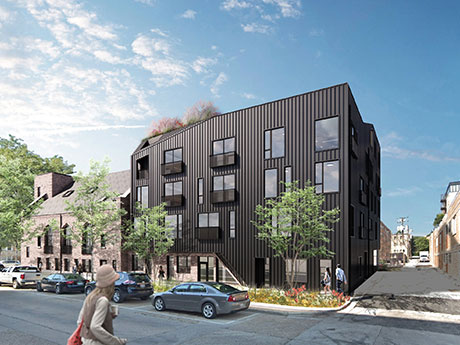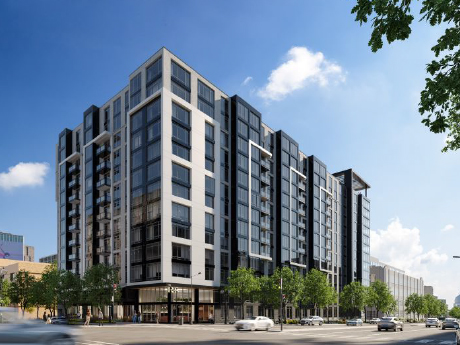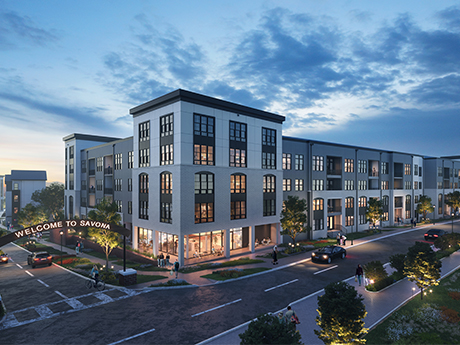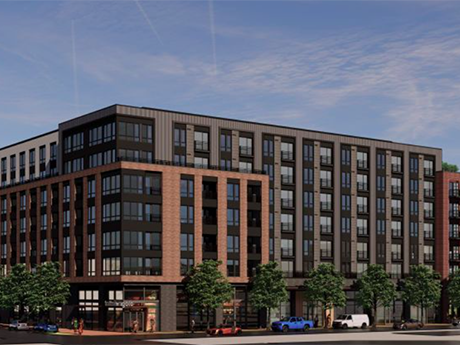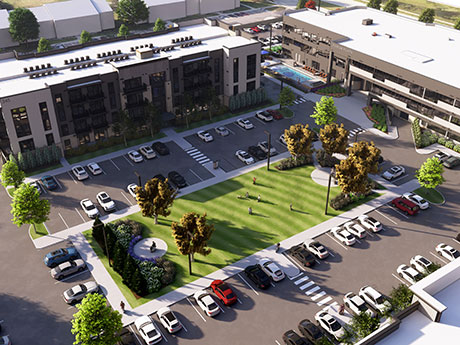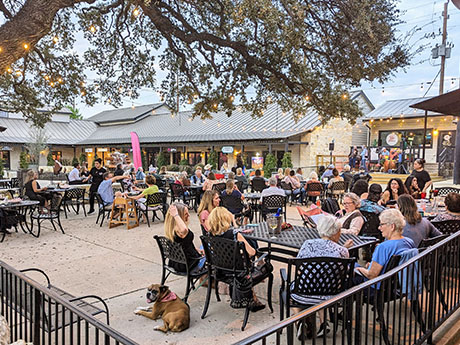EVANSTON, ILL. — The Apartment Source (TAS) has begun leasing efforts for Lodge Evanston, a 30-unit apartment project located at 1700 Oak Ave. in downtown Evanston. The 30-unit development is the adaptive reuse of a century-old sanctuary. The community offers one-, two- and three-bedroom layouts with several luxury penthouses. Development partners included Campbell Coyle, Ranquist Development and Jodi Development. ISA was the project architect. Monthly rents start at $2,400, according to the property’s website.
Search results for
"Adaptive Reuse"
By Blima Ehrentreu, founder and CEO, The Designers Group The urban real estate landscape is undergoing a remarkable transformation. With shifting work patterns and changing societal needs, design and development teams are working to convert underutilized office buildings into vibrant residential spaces. As office vacancy rates rise in cities like New York, San Francisco and Chicago, this challenge drives creative solutions that blend design innovation, virtual planning and sustainability. This dynamic landscape provides an exciting platform to reimagine urban living and meet the evolving demands of residents. At The Designers Group (TDG), we embrace the concept of adaptive reuse. Rather than tearing down old buildings and starting from scratch, we see value in maintaining existing structures and repurposing them in innovative ways. This approach not only aligns with our commitment to sustainability but also offers a chance to preserve the character and history of urban landscapes. Industrial elements such as exposed brick, concrete pillars and high ceilings can be integrated into residential designs, creating unique and compelling aesthetics. This focus on adaptive reuse means less waste and smaller carbon footprints, which is critical in today’s environmentally conscious world. By working with what already exists, we minimize the need for new …
— By Geoffrey West, Senior Vice President, Investment Property Sales and Acquisitions, MDL Group/CORFAC International — The Las Vegas retail market remains a tale of two cities with the tourism-driven Resort Corridor and surrounding MSA comprising two very different markets. In the past, the stories of the “cities” were somewhat divergent with robust development, premium rents, and top-tier restaurant, bar, entertainment and retail tenants dominating in the Resort Corridor. In contrast, the primarily suburban MSA experienced decreasing rental growth rates, metered new development and fewer exciting new tenants. However, looking at the past and current years, as well as into 2025, it appears the party isn’t just on the Las Vegas Strip anymore. Due in part to a statistical undersupply, the suburban Las Vegas retail market is poised to experience increasing rental growth rates over the next 12 to 18 months. The lack of new supply is expected to put continued upward pressure on retail leasing rates and downward pressure on vacancy rates, which are expected to be nearing record 2007 levels. Economic Summary The Las Vegas market saw the completion of more than $8 billion in development in 2023. Among these are the $3.9 billion, 3,644-room Fontainebleau Las Vegas, …
PASSAIC, N.J. — BridgeInvest has provided a $34.5 million acquisition loan for The Pennington, a 147-unit apartment complex located in the Northern New Jersey community of Passaic. The Pennington is an adaptive reuse of the former St. Mary’s Hospital complex, a site that spans about 3.5 acres. Units come in one-, two- and three-bedroom floor plans. Amenities at the pet-friendly property include a fitness center, children’s play area and a community room. The borrower was locally based investment and development firm The Birch Group.
WASHINGTON, D.C. — A partnership between the District of Columbia Housing Authority (DCHA), MRP Realty, CSG Urban Partners LLC and Taylor Adams Associates is nearing completion of The Iris, a 430-unit apartment community located at 1133 N. Capitol St. NE in Washington, D.C.’s NoMa district. The public-private partnership, along with property management firm Greystar, began tours and accepting lease applications last month at the 380,000-square-foot property. The first move-ins will begin next week. The Iris is a 13-story community featuring studio, one-, two- and three-bedroom apartments, 20 percent of which will be reserved for households earning 60 percent or less of the area median income (AMI). Monthly rental rates start at $1,820, according to Apartments.com. Amenities include a rooftop pool, dog park, coworking space, fitness center, sports bar, outdoor kitchen, private dining room, reading library and a mail and package center, as well as two levels of subterranean parking. The design-build team includes general contractor CBG Building Partners and architectural firm Moya Design Partners. The Iris represents Phase I of the three-phase adaptive reuse of the former DCHA headquarters site.
Portman Nears Completion of 319-Unit Vera at Savona Mill Apartments in West Charlotte
by John Nelson
CHARLOTTE, N.C. — Atlanta-based Portman has announced it is nearing completion of Vera at Savona Mill, a 319-unit midrise apartment community in Charlotte’s West End. First units are set to deliver in July. Vera at Savona Mill will offer one-, two- and three-bedroom options, as well as studios, lofts and townhomes. Amenities will include a resort-style pool with cabanas, a pet spa and dog park, fitness center with a yoga studio, game room and a coworking lounge. Portman plans to launch preleasing later this month. The multifamily property is the latest component of a mixed-use, adaptive reuse of a 105-year-old former textile mill that also includes retail space, creative offices, a community plaza and the expansion of the Stewart Creek Greenway that is set to open soon. The second phase of residential at Savona Mill is anticipated to break ground next summer and include 279 multifamily units and 40 townhouses.
Carr Properties Acquires Vacant Office Building for Multifamily Conversion in Alexandria, Virginia
by Katie Sloan
ALEXANDRIA, VA. — Carr Properties has acquired a vacant office building located at 901 N. Pitt St. in the Old Town neighborhood of Alexandria with plans to convert the property into a 250,000-square-foot multifamily community. The site, which will be cleared to make way for the new development, is located roughly seven miles south of Washington, D.C., and 1.5 miles south of the former development site for Potomac Yards, a recently cancelled 9 million-square-foot mixed-use project. The community will rise eight stories and feature 234 units in a variety of configurations, ranging from studio apartments to three-bedroom units. An unspecified number of units will be dedicated to affordable housing. The development will also include below-grade parking, 15,800 square feet of outdoor space, a performing arts venue and 7,000 square feet of ground-floor retail space. Shared amenities are set to include an outdoor swimming pool and a resident lounge and amenity center. Carr Properties plans to break ground on the development this fall with completion slated for late 2026. The community will target LEED Silver certification. The development team for the project includes SK+I Architecture and interior design firm Edit Lab by Streetsense, which partnered with Carr on its previous Union …
Partners Capital, CNR Retail Unveil Plans for 100,000 SF Office-to-Retail Conversion in Las Vegas
by Amy Works
LAS VEGAS — Partners Capital and CNR Retail have released plans to convert a 100,000-square-foot office complex, located at 2500-2550 Paseo Verde Parkway in Las Vegas’ Green Valley Ranch neighborhood, into an artisanal, food-driven, open-air lifestyle retail center. Dubbed The Cliff, the $30 million adaptive reuse development will offer 25 retail spaces, ranging from 1,800 square feet to 17,000 square feet; a central bar; a 26,000-square-foot covered outdoor dining lounge with communal meeting spaces; live performance area; fire pits; kiosks; and public art installations. The development team has also received approval of a tavern gaming license that would allow slot machines and small games of chance at one or more of the center’s pubs. The joint venture acquired the property in August 2023 for $17.2 million in an off-market transaction. Built in 2000, the property was 80 percent leased to office tenants at the time of sale. Pending final approval from the city, construction is scheduled to begin in October for completion in second-quarter 2025. AO Architects is serving as architect for the project.
TROY, MICH. — A joint venture between Cypress Partners and Douglas Capital Partners is slated to open Forum Flats in Troy this month. The luxury apartment complex is comprised of three buildings with 200 units. Amenities include a tenant lounge, pool, dog park and fitness center. The first of the three buildings involved the adaptive reuse of the 100,000-square-foot office space previously utilized by Kelly Services. The two additional ground-up buildings are set to open this summer. The project team included Krieger Klatt Architects and Tower Construction. Monthly rents start at $1,625. Individuals who apply or rent by April 15th will receive a $1,000 discount, which can be applied to their first initial payment. In addition, Forum Flats offers discounts for healthcare workers as part of their preferred employer program, which waives application fees, waives lease administration fees and offers a lower security deposit of $150 with approved credit.
Economic development is, in many ways, the business of facilitating growth. Yet in Texas, thanks to an array of business- and development-friendly policies and laws, influxes of jobs, people and new real estate projects to support them sometimes seem to just happen naturally. When this kind of heavy growth is sustained over time, it can lead to less-affordable housing, more cookie-cutter retail scenes and heavier congestion and pressure on local infrastructure. But it is possible for smaller municipalities to embrace job and population growth with new real estate uses and projects in ways that don’t entirely compromise the historic charm or tranquility that many residents of these cities value. Revitalizing a downtown area — bringing in new businesses, adaptively reusing older buildings, creating pedestrian-friendly networks — is a primary means of marrying those objectives. When a successful downtown revitalization program is executed, the benefits tend to have a domino effect. Elevated foot traffic boosts sales at local businesses, increasing asset values over time and stimulating sales of properties. Other investors take note of the viable business plan, and the rest becomes history. But the whole process often starts with the visions of local business owners and the willingness of local …


